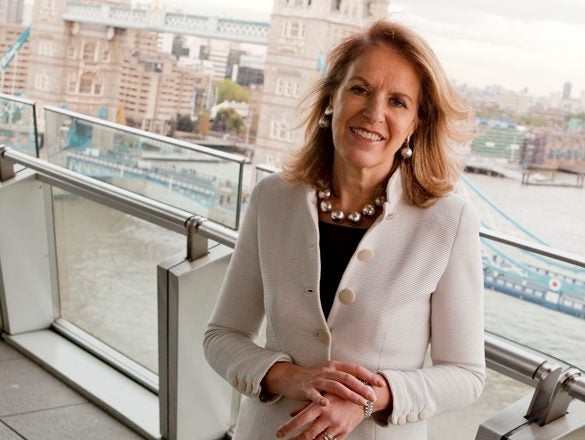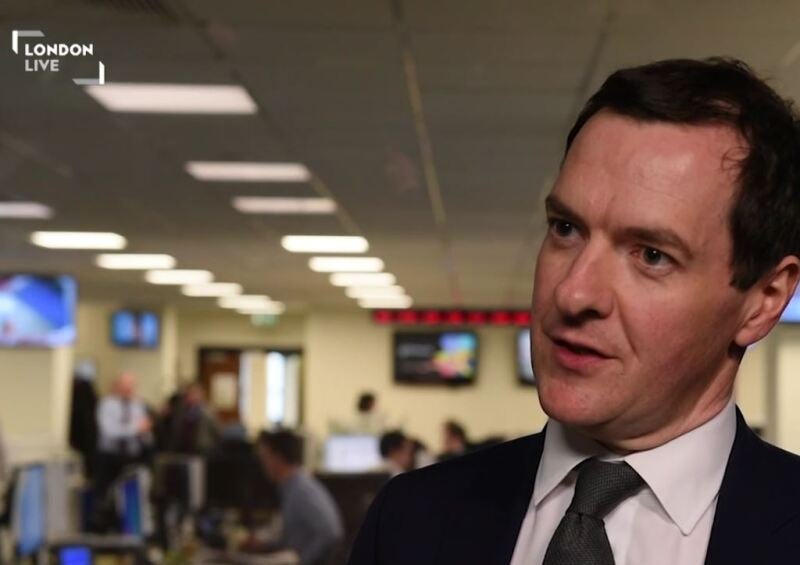
Former Evening Standard editor Veronica Wadley has said the controversy over George Osborne’s appointment as the title’s new chief is “a bit of a storm in a teacup”.
The former Tory Chancellor will take on the role in May, following Sarah Sands departure, and has drawn heavy criticism for already having five other roles, including that of MP for Tatton in Cheshire.
Wadley, who ran the Standard from 2002 to 2009 when it still published four daily editions (it’s now down to one) said Osborne would likely be more of an “editor-in-chief” than a hands-on editor.
She told Press Gazette his editorship might have some similarity with that of Lord William Deedes, a former Tory minister who went on to edit the Daily Telegraph in the 1970s and 1980s (though unlike Osborne he stepped down from Parliament the year he took on the role at the paper).
Wadley, who is chair of Arts Council London and an independent director of Times Newspapers, said the Standard’s “backbench” – led by production chief David Lucas with Ian Walker as deputy editor – would continue “to do the hard graft” and put the paper together day-to-day.
Although the Standard is currently facing deep cuts to its production staff with a proposal that some long-serving sub-editors move to half-days.
She said: “Editing the Standard now is a very different job from when I was editor. I was at the office from five o’clock in the morning until seven in the evening five days a week.
“When I was editor, I used to sit on the backbench for each edition, discussing news stories, writing the front page headlines, drawing up pages. I don’t expect George will do that in the short term.
“We produced four editions a day, we never went out for lunch, I had work dinners in the evening and did official appearances at big events and shows. It was a 24/7 job.
“It’s very different now. There is just one edition a day and George will have a very brilliant team around him.
“They are mostly the team that I hired when I was editor: David Lucas runs the backbench, Doug Wills is the managing editor, Joe Murphy is the political editor, Ian Walker is the deputy editor and news editor, Charlotte Ross is deputy editor and features editor, David Cohen is the investigations editor, Justin Davenport is the crime editor, Martin Bentham [home affairs editor] , Ross Lydall [health and chief news correspodent].
“They were all my guys and they are great guys and George is very lucky to have them.”
She added: “The demands on the editor will be different from my time, or indeed that of my predecessors: Paul Dacre [1991-92], Stewart Steven [1992-96] or Max Hastings [1996-2002].
“Perhaps it will be more like the days when Bill Deedes was editor of the Daily Telegraph.

Lord Deedes
![]() “He was a very distinguished Conservative politician and a former MP. He guided the Telegraph’s politics, he would have lunches and dinners with all his Westminster friends and come back with great stories and news editors would be delighted, diary editors would be delighted, and then he would write a brilliant column.
“He was a very distinguished Conservative politician and a former MP. He guided the Telegraph’s politics, he would have lunches and dinners with all his Westminster friends and come back with great stories and news editors would be delighted, diary editors would be delighted, and then he would write a brilliant column.
“He was very popular. But The Daily Telegraph was run by the backbench in those days – in the seventies and early eighties. A formidable man called Peter Eastwood was really in charge, everyone was terrified of him – Bill was probably terrified of him too. He was called managing editor but he really ran the paper.
“I can easily imagine that with George as editor of the Standard, he could follow a similar pattern.”
In response to claims that Osborne’s political and parliamentary obligations would affect his impartiality, Wadley said: “Every editor has a political point of view and you would expect that.
“The editor will have an argument to make and the paper will reflect his views. I hope he will have the freedom to do that. I’m very much a supporter of editors having that freedom from whoever owns the paper.”
She added: “Obviously George’s political experience and contacts will be very useful. It’s a very political job, being an editor. It has never been impartial. There’s no such thing really.
“The Independent I suppose would argue that it was an independent paper but I don’t think there’s any such thing now. And after all, the Standard is a free paper and therefore it’s not independent in other respects. It is entirely dependent on advertisers.
“If you no longer have a cover price, you can’t afford to upset advertisers and I think that’s a much bigger issue. That’s just the state of the industry. Even papers that have a cover price can’t afford to upset advertisers, they certainly can’t challenge them.
“When I was on the Telegraph and the Mail and as editor at the Evening Standard, if a major retailer or major airline did something we thought was disgraceful, we would publish it – as long as it was accurate and legally sound. I think it’s much more difficult now.”

George Osborne at the Evening Standard offices
Osborne has also come under fire for his lack of journalism qualifications.
He was editor of a student paper while studying at the University of Oxford but later failed to win graduate roles at The Times and The Economist, turning to freelance work on the Daily Telegraph’s Peterborough diary column before quitting journalism to join the Conservative Party.
Wadley said: “I am told that when George was Chancellor after the 2010 election he spent an evening on the backbench at the Mail with Paul Dacre and absolutely loved it and thought it was marvellous.
“That’s probably the closest he’s ever got to a backbench [in a newspaper]. But he is a bright guy. Politics is a big part of any newspaper.”
She added: “I am sure George will learn quickly. You never know, he may end up one day as editor of the Daily Mail if Paul Dacre ever decides to retire.”
Asked what Osborne’s biggest challenges would be as editor, Wadley pointed to the financial difficulties affecting the news media industry across the board as advertising revenue continues to decline.
“The finances of all papers are very difficult at the moment but some are handling it better than others,” she said. “The Evening Standard’s finances have not been good for many, many years.
“There was the collapse of classified advertising 25 years ago – it’s a long time ago and it’s been very difficult. Digital advertising hasn’t made up for that by any means.
“I’m a great supporter of the website – I started the website – but plummeting ad revenues are a huge problem for every paper, most of all for freesheets like the Standard.
“I hope there will continue to be a London paper and if there’s a proprietor who is prepared to pay for losses then that’s great. But it’s very difficult to come up with a robust business plan for any paper at the moment.
“Those forces will be out of George’s control – out of anyone’s control. Most newspapers are rewriting their business plans every six months. If you don’t have a cover price, you are entirely dependent on advertisers. That’s much more compromising than the fact that George is an MP.”
She added: “I think it’s incredibly important for London to have a paper so I wish George luck. He will certainly have a really interesting time.”
Email pged@pressgazette.co.uk to point out mistakes, provide story tips or send in a letter for publication on our "Letters Page" blog
